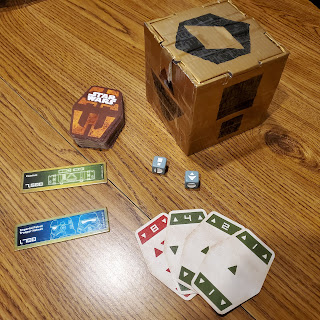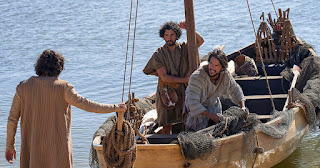Lord, If You Had Been Here: A Reflection on Last Sunday's Gospel
 |
| Source: Wikimedia Commons |
Are There Not Twelve Hours in a Day?
Before I get into the main point, I want to go on a brief tangent and look at the beginning of this gospel reading. Jesus is told that his friend Lazarus is dying. When he tells his disciples they are going back to Judea, they object. "Rabbi, the Jews were just trying to stone you, and you want to go back there?" His reply is, "Are there not twelve hours in a day? If one walks during the day, he does not stumble, because he sees the light of this world. But if one walks at night, he stumbles, because the light is not in him."
Now, if I had been one of the disciples, I don't know how I would have reacted to that reply. Probably something along the lines of, "Um.... okaaay... But, um.... Rabbi, the Jews were just trying to stone you, and you want to go back there?" It doesn't really seem like he's answering, or even acknowledging, their question. What does sunlight, and its property of allowing you to not bump into stuff, have to do with the danger of returning to a place whose inhabitants are trying to kill you?
I'm no Scripture scholar, nor do I speak with the authority of the Church, but here's what I was able to come up with. Jesus is almost certainly not just talking about sunlight. It helped me to consider the other readings this one was paired with at Sunday Mass. In both the first reading, Ezekiel 37: 12-14, and the second reading, Romans 8:8-11, we hear about the Spirit of God being in us. So when I hear Jesus say "he stumbles because the light is not in him," it seems to me that he's referring to the Holy Spirit. Furthermore, the passage from Romans is all about the contrast between your spiritual life (the state of your soul) and your physical life (whether you are physically alive or dead). So my interpretation of Jesus's reply is that there are more important things than they physical danger awaiting them in Judea. This is not to say that physical life and death are meaningless, and I will definitely dig deeper into that later in this post.
That Doubting Thomas
I don't know whether Thomas understood what Jesus meant, or if he just trusted him, but he declares, "Let us also go to die with him." This is very interesting, because what is Thomas's nickname? If your first thought is Didymus, congratulations, you get a bonus point. But I'm referring to the other nickname, "Doubting Thomas." Thomas is most famous for doubting that Jesus had risen from the dead, because he was the only one of the Twelve (Eleven, I guess, since Judas was no longer with them) who hadn't seen Jesus in person since His death. But less often remembered is his earlier faith and courage, his willingness to die with Jesus. I just thought I'd point that out, since Thomas tends to get a bad rap. (This was originally pointed out to me by the character Benjamin Linus on the TV show LOST.)
Lord, If You Had Been Here
Okay, on to my main reason for writing this post. Jesus is told about Lazarus before he dies, but he stays where he is for two days. He allows Lazarus to die, without intervening. Why? Martha meets Jesus on the road and says, "Lord, if you had been here, my brother would not have died." After my wife and I lost two babies to miscarriage, Lucy and Elliot, a priest who was counseling us pointed to this verse. It was comforting, at first, to see someone in the Bible express the same thought I had. Why didn't God save my children? Why did He let them die?
Of course, the natural objection is, Jesus proceeds to raise Lazarus from the dead, but my children are still dead. But that's not the lesson of this Gospel story. Jesus isn't telling us, "It's okay if someone you love dies, because I can raise them from the dead." The resurrection of Lazarus points to the resurrection that will occur at the end of the world. We will all be restored to our bodies, and for those of us who died in communion with Christ, death will no longer have any power over us.
Just as with his mysterious statement about the twelve hours in the day, Jesus is telling us (among other things) that there are more important things than physical life and death. However, we must be clear. An incorrect conclusion to draw is that physical death means nothing. If that were true, there would be no reason to mourn. But Jesus's heart goes out to Martha and Mary. He is deeply troubled by their grief, and he himself experiences grief for the death of Lazarus. Knowing that death is not the end does not do anything to ease the pain of losing a loved one, especially not in the immediate wake of a loss. Jesus even knows that Lazarus will be back with them in a matter of moments, but he still weeps.
Even though God always brings good out of suffering, it doesn't mean we suffer any less. He doesn't expect us to take the suffering, shrug it off, and say, "No worries, everything will turn out great in the end." That would be a totally unnatural response. Not even Jesus, the perfect human, reacted that way. We should also notice that Jesus doesn't rebuke Martha for essentially blaming Him for Lazarus's death. Being mad at God is okay, as long as we keep believing in Him, and keep praying to Him.
I'll finish by saying that there is no way I could have come to this conclusion in the immediate aftermath of Elliot's death (which was only five months after we lost Lucy). This understanding only came from more than a year of receiving the sacraments, being supported by friends and family, and continually asking God for answers, or at least for peace.
Thanks for reading! If you like my blog, and you'd like to receive emails each time I upload a new post, you can enter your email address below. Or, you can "Like" or "Follow" GCD's Facebook page here. Find me on Twitter here. If you want to express an opinion, ask a question, or give feedback about this post or others, feel free to leave a comment below, or email me at geekycatholicdad@gmail.com.
You can find other posts about miscarriage by clicking on Miscarriage Posts up in the navigation bar, and find resources for parents who have suffered loss on the Miscarriage Resources page.
I am a participant in the Amazon Services LLC Associates Program, an affiliate advertising program designed to provide a means for sites to earn advertising fees by advertising and linking to Amazon.com. This means my reviews, GCD Picks, and some other posts include links to Amazon in case you want to buy the product after reading my review. If you do make a purchase via my affiliate link, I'll get a few cents.
So if you would like to send a few pennies my way (which I use to pay for hosting the site), you can use my Amazon links to purchase any of the items I have recommended, or anything at all from Amazon. Alternatively, you can click the Amazon link here, and then proceed with your Amazon shopping.



Comments
Post a Comment